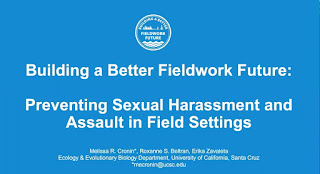 |
| Melissa Cronin |
Cronin began by addressing the unique challenges presented by field work, including limited outside communication and ways to leave, close quarters, power asymmetry, and interactions with non-group members, among others. After addressing the recently acknowledged prevalence of harassment and assault in field work, Cronin explained that an effective way to prevent these instances from occurring is to address the “organizational climate”, or the shared collective norms and values of an organization or setting. This motivation, to change organizational climate, drives the program she co-developed with Drs. Roxane Beltran and Erika Zavaleta called Building a Better Field work Future: Preventing & Managing Sexual Harassment & Assault in Field Science, or BBFF for short.
 |
| click image to view video |
BBFF is a 90-minute, highly
interactive workshop that has now been conducted for over 800 participants
across many institutions, including some in Germany, the United Kingdom, and
Nigeria. This program provides examples of tangible policies that institutions can adopt
relating to harassment prevention, intervention, and response, such a
developing a code of conduct or community agreement (prevention), hosting
bystander intervention training (intervention), or implementing zero-tolerance
policies (response). This workshop then leads participants through four
scenarios increasing in severity and encourages participants to “think out
loud” and discuss solutions to these scenarios, keeping in mind that there may
be no “right answer.” With an intentionally positive and empowering tone, this
workshop helps participants prepare for their field season and become aware of issues
and experiences they were not aware of before.
The popularity of BBFF has grown
considerably, and assessments indicate that the highly rated workshop is
increasing participants’ knowledge and confidence in these issues. BBFF has
become so popular and in high demand that they have implemented a new “Train
the Trainers Facilitator Program”, which trainers other individuals, who so far
have come from a wide range of disciplines and career stages, to host these
BBFF workshops elsewhere. Cronin and her colleagues have also made resources
widely available and hope to contribute to a more inclusive cultural shift that
values prevention of these issues.
Melissa Cronin is a Ph.D. candidate in
Ecology and Evolutionary Biology at the University of California Santa Cruz,
where she studies mapping and mitigating marine fisheries bycatch as a member
of the Conservation Action Lab. Prior to her graduate studies, Cronin worked as
an environmental journalist covering climate, politics, and wildlife crime, with
stories appearing in The New York Times and Popular Science,
among other outlets.
BBFF is coming to SUNY ESF on April
15th from 7:00-8:30 pm, for those who are interested in experiencing
this interactive workshop. This workshop, the next installment in the WiSE Professions speaker series, will be led by Dr. Amanda Adams,
Conservation Research Program Manager, Bat Conservation International and
Lecturer, Biology, Texas A&M University. Space is still available; sign up
at bit.ly/WiSEProfessions.
Perspectives on Career and Gender/WiSE Professions
As part of the course requirements for FOR797 Perspectives on Career and Gender, students share responsibility of reporting on speakers, both in class and in the campus-wide Women in Scientific and Environmental Professions Speaker Series. The preceding was prepared byJenna Zukswert, graduate research assistant and PhD student, SUNY-ESF Department of Sustainable Forest Resources.
No comments:
Post a Comment